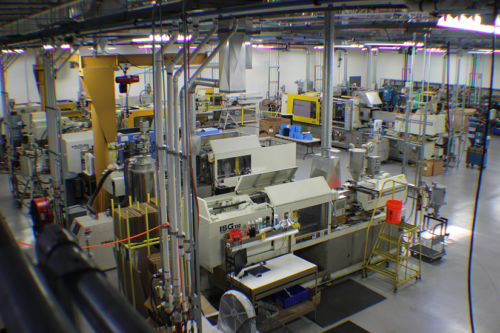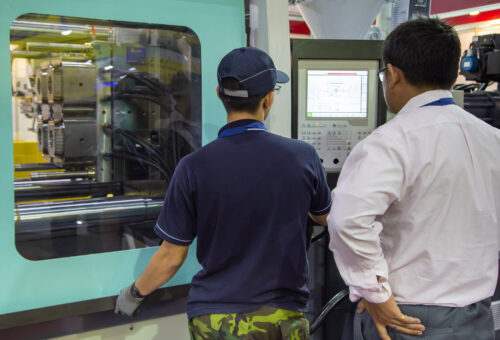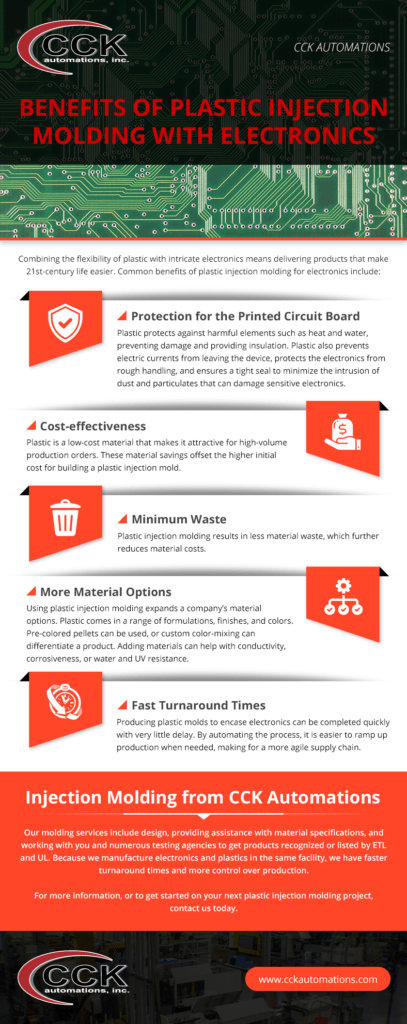 Plastic injection molding creates the perfect construct for today’s electronics. Plastic polymers are flexible with micro-tolerance characteristics for design accuracy. Their ease of use makes them the perfect match for creating housings, connectors, and switches. With a full-service company such as CCK Automations, you can go from design to prototype to production under one roof.
Plastic injection molding creates the perfect construct for today’s electronics. Plastic polymers are flexible with micro-tolerance characteristics for design accuracy. Their ease of use makes them the perfect match for creating housings, connectors, and switches. With a full-service company such as CCK Automations, you can go from design to prototype to production under one roof.
Injection Molded Electronics
Plastic is an ideal material for a wide range of electronic products. To suit the needs of various projects, plastic resin can be conductive, non-conductive, UV resistant, and combined with watertight seals to ensure protection against moisture. Plastic resins are suitable for rigid or flexible applications, come in a wide variety of colors, and have more design capabilities compared to metal and other materials. Materials such as pronged plugs, connectors, and special pin arrangements can be incorporated into plastic to allow for conductive properties.
Overmolding adds plastic material to casted or metal parts to increase flexibility. Plastic resin comes in a range of formulations that offer features that other materials can’t provide, such as corrosion resistance and shock protection. Because plastic is easy to work with, you can lower assembly costs by incorporating snap-together tabs that interlock without screws, staples, or fasteners.
 Benefits of Plastic Injection Molding
Benefits of Plastic Injection Molding
Combining the flexibility of plastic with intricate electronics means delivering products that make 21st-century life easier. Common benefits of plastic injection molding for electronics include:
- Protection for the printed circuit board. Plastic protects against harmful elements such as heat and water, preventing damage and providing insulation. Plastic also prevents electric currents from leaving the device, protects the electronics from rough handling, and ensures a tight seal to minimize the intrusion of dust and particulates that can damage sensitive electronics.
- Cost-effectiveness. Plastic is a low-cost material that makes it attractive for high-volume production orders. These material savings offset the higher initial cost for building a plastic injection mold.
- Minimum waste. Plastic injection molding results in less material waste, which further reduces material costs.
- More material options. Using plastic injection molding expands a company’s material options. Plastic comes in a range of formulations, finishes, and colors. Pre-colored pellets can be used, or custom color-mixing can differentiate a product. Adding materials can help with conductivity, corrosiveness, or water and UV resistance.
- Fast turnaround times. Producing plastic molds to encase electronics can be completed quickly with very little delay. By automating the process, it is easier to ramp up production when needed, making for a more agile supply chain.

Injection Molding from CCK Automations
CCK Automations has full-service plastic injection molding capabilities. Our molding services include design, providing assistance with material specifications, and working with you and numerous testing agencies to get products recognized or listed by ETL and UL. Because we manufacture electronics and plastics in the same facility, we have faster turnaround times and more control over production. For more information, or to get started on your next plastic injection molding project, contact us today.
